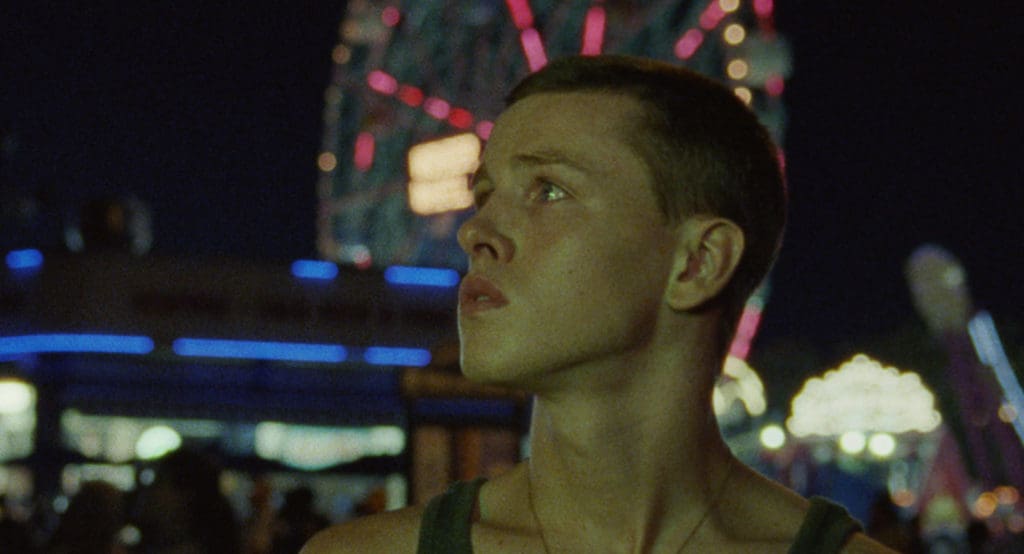
While the two films were made completely independently of one another, it’s almost impossible to watch Beach Rats and not immediately think of Moonlight. It might not be a fair comparison, but both films take a gritty look at what it means to grow up gay in a hyper-masculine environment – they even both contain key scenes where the main character’s life is changed on a beach. But while Eliza Hittman’s new film can’t hold a candle to Barry Jenkins’ Best Picture winning masterpiece, it is a film that deserves to be judged on its own terms – it’s tough to watch, and deeply upsetting, but well made and beautifully performed.
Set in the outer edges of Brooklyn, Beach Rats follows Frankie (Harris Dickinson), an aimless teen who spends most of his time wandering the neighborhood with his troublemaking friends. He has a sick dad at home, an overworked mother, an annoying pre-teen sister, and a potential new girlfriend, Simone (Madeline Weinstein). But Frankie has a secret life that exists only in sketchy chat rooms at night – one where he cruises through the neighborhood looking for older men to have sex with. As Frankie tries to process his sexual identity – and learn how to healthily express it – he finds his multiple worlds and obligations colliding in unexpected ways.
Beyond anything else, Beach Rats deserves praise for the way that writer/director Eliza Hittman creates an unshaking sense of realism. Frankie’s interactions with his family and friends feel genuine and unscripted, almost as if Hittman just turned a camera on and hit the streets of Brooklyn to see what she could record. This realism carries over into Frankie’s double life, however, as he explores sex chat rooms and meets with strangers at motels. Some scenes feel uncomfortably genuine, almost as if we’re voyeurs peeking in on a real life couple. And she pulls no punches in terms of content depicted as well – the fact that she got an R rating, as opposed to an NC-17, is nothing short of astounding. Only a truly talented director can create such a convincing illusion of realism.
The problem with Beach Rats, however, is the way it fails to create compelling narratives to populate its realistic environment. Outside of Frankie and Simone, many of the characters remain underdeveloped, if not completely one-note. The narrative also dissolves into an episodic series of encounters, which are individually interesting but never amount to much of anything. The film’s final plot thread, meanwhile, feels especially short, which is upsetting as it ties together many of the different key themes into a somewhat underwhelming conclusion. It’s not that these plot threads are poorly directed – it’s just that it would have been more effective had they all been fully developed and combined into one, single, storyline populated with fully-fleshed characters.
That being said, the ensemble does their very best, no matter how little they’re given for their parts. There isn’t a miscast actor in the bunch, and everyone helps contribute to the overwhelming sense of realism onscreen. In the lead role, Harris Dickinson both convincingly drops his British accent in favor of a Brooklyn one, and harrowingly portrays the angst and anxiety his characters is plagued with. It’s a quiet, largely physical performance, and he does a nice job.
By his side throughout the film is the explosive Madeline Weinstein, who breaks out in a big way as Frankie’s girlfriend, who is blind to her boyfriend’s sexual orientation but suspects that he is battling demons. Weinstein, in her cinematic debut, emerges as a name to pay attention to in the coming years.
With a very small release, mainly consisting of theaters in NY and LA, Beach Rats is the sort of independent film that will likely find most of its audience over streaming services in the coming years. But it’s the sort of film that, no matter how flawed, deserves attention, both as a film with a female director and as a film shining a spotlight on an underrepresented community. It’s not a perfect film, but a realistic one with some phenomenal performances.

